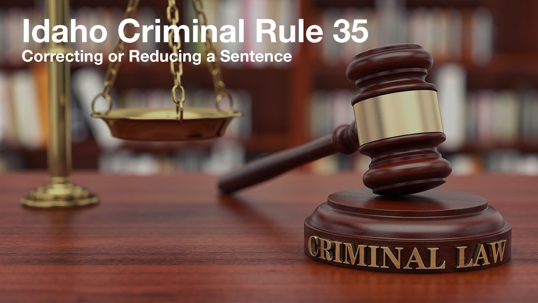Last week I answered the question, what is a rule 11 agreement? Today I answer an even more elusive question, and that is what is a rule 35 motion? Idaho Criminal Rule 35 has reached almost mythical status among those in custody in the jails and prisons of Idaho. Each week I get at least one phone call from either an inmate, or a friend of family member of an inmate, asking about Idaho Criminal Rule 35. The myth about rule 35 that I hear most frequently is that filing a rule 35 will automatically cut a defendant’s sentence in half! Of course this is a fantasy, and no such rule exists that will cut your sentence in half.
Idaho Criminal Rule 35 is a statute that governs the correcting and reducing of sentences handed down by judges in misdemeanor and felony criminal cases in Idaho.
In addition to correcting illegal sentences, a motion can also be filed to ask for a reduction in the sentence. The grounds for requesting a reduction in a sentence can either be because new evidence has been discovered that the judge did not have the opportunity of examining that could motivate him to reduce the original sentence. A request for a reduction can also be made simply on grounds of leniency. In other words, you can make the request simply because you think the judge may have been excessively harsh when handing down the original sentence.
The rule allows a judge to correct an ILLEGAL sentence at any time. For example, if a judge sentences a defendant to 20 years in prison, but the maximum sentence of that particular crime is 10 years, then a motion could be brought to correct the “illegal” sentence, and the judge could (and obviously should) correct the error.
Such motions generally must be made within 120 days of the defendant being sentenced, although you will want to speak to a criminal defense attorney about the specifics of your particular case.
As you might imagine, the likelihood that a judge is going to grant a rule 35 motion decreases the further down this list you go. If the sentence is illegal, the judge is likely guaranteed to change it. If new evidence is discovered that would motivate the judge to reduce the sentence, then the judge is less likely to decrease the sentence than if it were an illegal sentence, but there is still a chance. Finally, if you are simply asking the judge to reduce the sentence out of the kindness of his heart, then you are very unlikely to obtain the leniency you desire.
A judge can handle these requests in two ways. He can either simply deny the motion without a hearing. Or he can grant a hearing, and reserve his ruling until after considering oral argument and additional evidence.
If someone tells you that a rule 35 is the silver bullet that is going to save your freedom after a sentencing hearing, then you may be disappointed. However, that is not to say it is not worth a try. You really have nothing to lose. Especially if there is evidence that was not available to the judge at the sentencing hearing that could change his mind.

